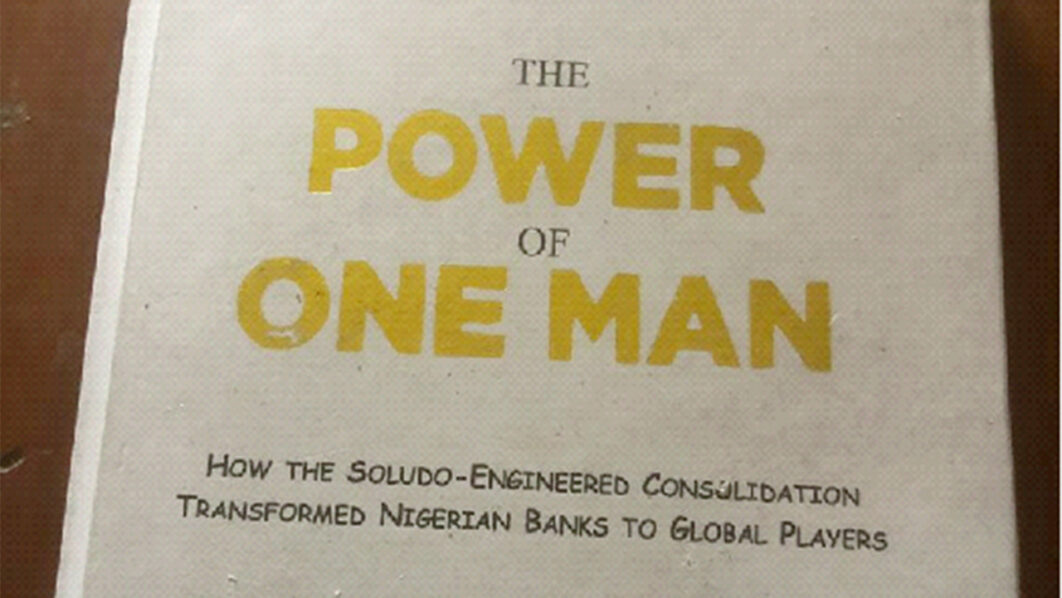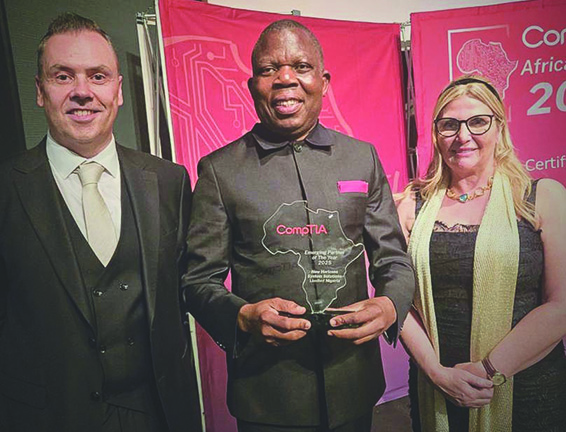
Book: The Power Of One Man— How The Soludo-engineered Consolidation Transformed Nigerian Banks To Global Players
Author: Ray Echebiri
Reviewer: Maduabuchi Dukor
In the book, The Power of One Man—How The Soludo-engineered Consolidation Transformed The Nigerian Banks To Global Players, historical reminiscence is in the upswing with the story of how one man with strength of character trailblazed the Central Bank of Nigeria(CBN) leaving behind a consolidated, internationalised and revolutionised banking system in Nigeria.
Dr. Ray Echebiri, the author of this book, researched on the liberal economy of Nigeria and its challenges before and in the Fourth Republic as a thesis on Development economics, reforms and banking metamorphosis in Nigeria. It’s an indexical representation of progress in history, of how the strength in character in Professor Charles Chukwuma Soludo, the anchor and executor of the ever great reformation in the economy and banking industry, could change games in governance in Nigeria.
As Nigerians savour the impact of this governance in the manufacturing, maritime, insurance, education, health, oil and gas, service industries the icon and trailblazer is on it again in Anambra State.
Lessons from this positive game change in Nigerian economic history are palpable in the various interventions to woops and warps, the epistemic and historical trajectories of the economy before the Fourth Republic.
With an analytical and critical mind set and hindsight, Professor Soludo engaged the Babangida’s Structural Adjustment Program (SAP), the Obasanjo’s Operation Feed the Nation (OFN), the Shagari’s Green Revolution and the inherent abusive tendencies of liberalism. Yet, SAP was the major index tendencies of liberalism. Yet, SAP was the major index and supervening factor aimed at galvanising the layers of the economy for engineering GDP and economic growth.
Within this socio-economic framework were National Directorate of Employment (NDE), Directorate of Food, Road and Rural Infrastructure (DFRRI), Second-tier Foreign Exchange Market (SFEM), Nigeria Deposit Insurance Corporation (NDIC) and so on. Lacking in democratic contents and ingredients, it was awaiting the power and strength in character of one man in the history of banking in Nigeria.
The liberalisation of the Nigerian economy was one of the curious hallmarks of Military regimes in Nigeria with decrees upon decrees promulgated on the Centrak Bank of Nigeria and other financial institutions, albeit, to stimulate economic growth, GDP and avert insipid and manifest crisis. Diachronically, the power of one man, Professor Charles Chukwuma Soludo, was the savior in the banking crashes that were due to the hitherto absence of the strength of character necessary and sufficient for economic developments.
The spectrums of social and economic engineering then were comprehensively and severally associated with the visions of some military junta who were, however, sensitive to global, foreign and domestic capitol formations. But there were shortcomings and gaps in theory, data and practice exposing the need and presence of a philosopher and executor. Inevitably, the biggest banking crash in the 1980s and 1990s were as a result of identifiable policy mistrust, sloppy executions and somersaults characterised by weak governance structure, poor risk management and internal control mechanisms, insider abuse syndrome by directors, non-performing loans crisis, infighting within and outside boards and managements of financial institutions and so on. Banks and financial institutions were wobbly, and the cases of Eagle Bank, Investment Bank of Nigeria and the 41 Banks that were swept away by systemic corruption crisis are highly tragic even as Unite Bank of Africa(UBA), First Bank of Nigeria, (FBN), Union Bank and so on are fledgling and unwholesome with negative impacts on the Nigerian foreign exchange , inflation rate, monetary rate, fiscal revenue and consumer and service prices. The military junta governments could not but became bemused over Nigeria’s survival in the common wealth of nations. The defacto government of General Sani Abacha had to roll out “The Nigerian Failed Banks (Recovery of Debts) and Other Financial Malpractices in Banks Decree”. That would not subsist as the solution but for the strength of character and becoming of Soludo as the CBN Governor.
Before Professor Charles Chukwuma Soludo was appointed the Governor of CBN his innate incubation and exhibition of strength character was a tested case in President Olusegun Obaanjo’s administration as Chief Economic Adviser.
By Soludo’ advisory ingenuity and advocacy, the National Economic Empowerment and Development Strategy (NEEDS) and the State Economic Empowerment and Development Strategy (SEEDS) were created to facilitate multidimensional developments in all sectors of the economy and which became evident in telecommunications, agriculture, service industries and foreign direct investments. The unalloyed strength of character deployed as Chief Economic adviser and the resulting reformation of National Planning Commission and creation of National Bureau of Statistics amongst others recommended him for the apex banking and economic leadership in Nigeria, heralding the authoritative banking revolution carried out as the CBN Governor.
Soludo’s address at the special meeting of Banker’s Committee of July 6, 2004 was a magnus Opus and a revolutionary praxis in banking industry in the decade. Titled, “Consolidating the Nigerian Banking
Industry to meet the Development Challenges of thy 21st Century”, it was a proclamation for mergers and acquisitions as instruments for resilient banking, a recipe for fledgling banking institutions in Nigeria amid macro-economic and global economic headwinds and a need for a restructured banking system for the 21st century, albeit, with the regulatory fee of N25 billion.
Professor Dukor is President/Editor-in Chief, Essence Library (Cultural and Scientific Development Center), UNIZIK.
Although this did not escape the critical cynosure of partisan and politically and economically vested interests it was paradigmatic alibi for a distraught and distressed banking economy in dire need for best practice, corporate governance, regulatory capacity, enhanced capital base, IT driven culture and competitiveness in a globalised world. Only the strength of character of one man could achieve this in a spate of time and space. At the end of the reformation the recapitalisation domino gave birth to 25 consolidated banks and fizzling out of 41 banks out of the choked financially corrupt system.
Subverting the knee-jack and rule of thumb practices, the strength of character of one man projected the emergence of a trifling banking industry in Nigeria in the late 1990s.The consolidation and recapitalization exercise engineered by CBN under Soludo’s watch resulted to trim, manageable, consolidated, capitalised, regulated, supervised banking and financial institutions sparkling with transparency, accountability, good corporate governance and international best practices.
The dream, intellectual power, and strength of character of one man impacted positively on the economy and on the fledgling and challenged banks, most of which capitalised with above N25billion, for example, UBA, Intercontinental Bank, Fidelity Bank, Zenith, GTB, IBTC, Union Bank and so on. Mergers and acquisitions became the lubricating oil of huge inflow of liquidity, foreign exchange, foreign direct investments, sprouting small and medium enterprises (SMEs) and robust economic growth. Accompanying the phenomenal economic growth. Accompanying the phenomenal growth of financial liquidity are smart businesses, customer relations and marketing communications models, even as mortar and brick banking gave way for electronic banking (e-banking) in Nigeria such as the use of debit cards, ATMs and Point of Service (POS). By the power of the strength of character of one man, oil and gas businesses in Nigeria and multi sectoral entities boomed as Banks dazzled at the world economic stage and the Nigerian economy became the second largest in Africa.
A seamless and bottom rock foundation was already laid for Professor Charles Chukwuma Soludo’s successor, Mallam Sanusi Lamido Sanusi as the CBN Governor, who studiously, diachronically and synchronically continued to consolidate on the principles and gains of the strength of character and power of one man in the Nigerian banking industry. The reinvigoration of the consolidation was a wake up action on both the heels of his appointment by President Umaru Musa Yar a’dua and alleged retrogression of the banking industry to the 2004 malaise. Sanusi, in the face of uncertainties blighting Soludo’s trail introduced reforms specifically hinged on liquidity crisis, alleged universal banking of doing every business in the name of banking and too much borrowing that beclouded the banking efficiency, which led to sacking of the Chief Executives of Oceanic Bank, Union Bank, Intercontinental Bank, FinBank and AfriBank.
Aside from Sanusi’s reforms that strengthened the code of corporate governance and regulatory functions, Nigerian banks since Soludo’s revolution has become major employers of labour and key players in African financial markets courtesy of the African Continental Free Trade Area (AfCFTA). Soludo’s revolutionary strength of character in corporate governance is now being replicated to political governance in Anambra State.
Professor Dukor is President/Editor-in Chief, Essence Library (Cultural and Scientific Development Center), UNIZIK.






